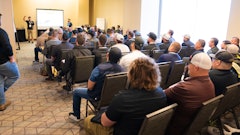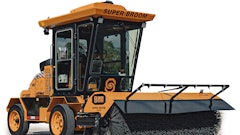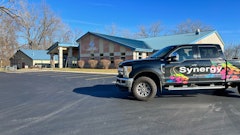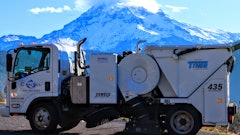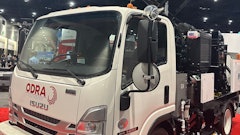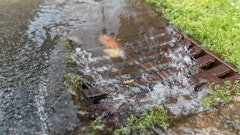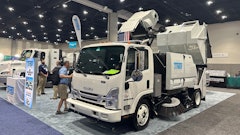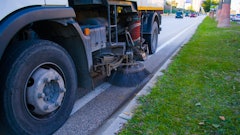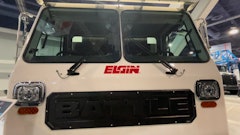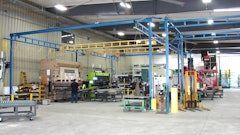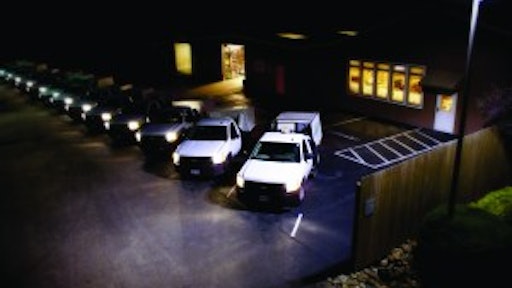
Every contracting business has its issues - the part of the business that if only they could solve it everything else would fall into place. For contract sweepers that issue is arguably operator hiring and productivity because, unlike the paving or sealcoating crews that operate during the day and in groups, sweeping requires a person with special characteristics to tackle that job - and handle that lifestyle - successfully.
Scott Graby, founder and president of 25-year-old Hearthstone Property Services, Murfreesboro, TN, says his company has figured out some unorthodox, but surprisingly effective ways to identify, hire, monitor, compensate, and retain quality sweeper operators.
Hiring and Screening
Graby says Hearthstone has developed an approach to finding and screening sweeper operators that has proved very effective over the years and has been cost effective as well. The process begins with ads placed on the Craigslist website as opposed to running in newspapers.
"We put a detailed description of the job on Craigslist, and we couldn't do that in a newspaper," he says. "In a newspaper we couldn't put enough detail in the ad because of the cost, where on Craigslist we can tell them exactly what we want to tell them and exactly what the job is going to be like. That's the first level of screening because a lot of people read it and decide right there it's not for them."
The next step for an applicant is to complete an online application and a personality assessment. These are accessed through the Hearthstone website and are sent in via e-mail. Graby says one real advantage of this process is that to this point the company has spent almost zero dollars seeking an employee.
"First, we remove the ones with questionable applications, such as having a DUI or a criminal record, lack of reliable transportation, short job histories, and 'fuzzy reasons' for leaving past jobs."
Then Hearthstone evaluates the personality test. "We've done baseline testing on our best drivers so we simply look for the test results that match the baseline.
"It's an unusual type of job that takes a special breed of person who can take pride in doing good work year after year. It's done late at night, the driver is all alone, it's not ideal for a 'people person,' and this test does a great job of identifying the type of person who might be successful operating a sweeper. In fact, only 20% of the applications make it past this point."
Graby says that if the assessment looks good Hearthstone then calls the references and if those check out they invite the applicant in. If he passes the interview stage, the applicant then rides with the supervisor for two or three hours one night to finalize the decision. Graby stresses that the applicant doesn't do any work on this ride, he just listens to the supervisor and gets to see first-hand what the job entails as the supervisor sweeps a number of parking lots.
"We don't pay them for that ride, and that's all in the application up front," Graby says. "We don't pay them any money until we think they can do it because until you get them out there in the truck and on the job they really don't know what's involved. They get to see that you're alone, that it's emptying trash cans and blowing curb lines, and that it's dirty work."
He says that after that night about half the applicants either turn the job down or are turned away by the supervisor. "After two or three hours it's usually obvious if the applicant 'gets it' or not. We're actually trying to talk them out of the job during the ridealong, knowing that the drivers who fit best won't be scared off. And the ones we can scare off would have dropped out anyway."
Sweeping Is Phased In
Graby says Hearthstone took a slightly different route into the sweeping and pavement maintenance industry, starting out in 1985 cleaning offices. Gradually, the company moved into parking lot sweeping then eventually added landscaping, general maintenance, infrared patching, and interior construction.
"One of the banks we did janitorial work for wanted us to sweep so we bought a sweeper," he says. "It took us a couple of years to get any traction with parking lot sweeping but eventually we did, and sweeping has really helped us."
Currently, Hearthstone employs 50 people and services more than 400 properties in middle Tennessee from the Kentucky border to the Alabama border. Graby says 40% of Hearthstone's work is sweeping, 40% is landscaping, and 20% is a combination of all other services. He says 2010 will show an increase in sealcoating and striping work because the company brought an asphalt contractor in-house in 2009.
Graby says that almost 300 of Hearthstone's properties are sweeping properties, and most require multiple services. He says the Hearthstone sweeper fleet contains 15 sweeper trucks (nine are made by Skavin'jer) and the contractor runs 11 routes. Four extra machines are at the ready in case of a breakdown or for special services. Properties are a mix of big box retail, shopping centers, and some office complexes, and he says the market has held up fairly well over the past couple of years.
"We've had a few clients that needed to reduce frequency of sweeps but so far that hasn't happened much," Graby says. "Our market held up pretty well."
In fact, he says the recession has weeded out some of the contractors who took properties on price alone. "My guess is those contractors got a little too far extended and ran into some problems," he says.
Two-person Teams and Four-night Shifts
Graby says that adding sweeping to the company's services was a process that took time, but now with 22 drivers he says Hearthstone has developed a system of seeking, screening, training, and compensating operators that has proved effective.
"We've gone through a metamorphosis on how best to deploy them," Graby says. "We used to use five-day shifts but that didn't work for us."
So the contractor now uses two four-night shifts of fulltime operators. One shift runs Saturday through Tuesday and the other runs Tuesday through Friday. Drivers share sweeper trucks and they overlap every Tuesday night when Hearthstone provides a home-cooked dinner, has an operator meeting, and sends the two drivers out as a team.
"With two guys in each truck on Tuesdays that becomes 'detail night' where we blow everything out of every corner and every crevice. One guy is in the truck at all times and the other guy is outside the truck blowing all night," Graby says.
"This doesn't allow them to coast the rest of the week but it does enable easier sweeping on the other nights because all the tight spots have already been blown clean. It also enables us to make sure that every corner of every property gets blown clean at least once a week."
Another advantage is the drivers become partners and they get to know each other pretty well.
"Then it's easier for one to cover for the other if one needs a night off," Graby says. "They have to let us know they're doing that of course, but they can arrange it themselves. They get to be friends and that always helps a working relationship."
Unlike most contract sweepers, Hearthstone Property Services has a waiting list of people wanting to come to work for the company.
Compensation & Rankings
Rather than pay operators on an hourly basis, Hearthstone has developed a "book rate" system that pays based on a predetermined number of minutes it takes to sweep each property plus travel time for the entire route.
"I hate to pay hourly because the drivers push it to make more money and the labor costs get out of whack," Graby says. "Book rate helps us keep an eye on labor costs and enables us to keep those costs in line."
Graby says some property and route times are determined by actual auditing where they are driven by a Hearthstone supervisor but often times are estimated using Google Earth.
"But we encourage the guys to tell us if we're not in line with the anticipated time to run the route, and then we'll review it," Graby says. "Sometimes our times aren't accurate - maybe we don't estimate traffic correctly for that time of night or something - but we will look into it and change the time if necessary."
As an example, one of the contractor's Wednesday night routes totals 733 minutes of sweeping including travel. Dividing the 733 by 60 minutes Hearthstone agrees to pay that route driver for 12 hours of work (733 ÷ 60 = 12.21 hours) a night.
"So the driver gets paid for 12 hours, but he can probably do the job in nine hours," Graby says. "So if we're paying him $11 an hour for 12 hours he gets paid $133 for the route which is 12 hours worth of pay. But if he can do that job in nine hours he still gets paid $133 for the route but his hourly rate has gone up to $14.77 per hour ($133 ÷ 9 = $14.77). He can be done quicker and make the same money at a higher hourly rate. The quicker they can work the better they can make their pay rate."
The obvious flaw in the system, which Hearthstone (and some drivers) discovered immediately, was that operators could cut corners to get the jobs done quicker. "So we put a night supervisor on to make sure we maintain the quality on the job, and that's worked out great."
The supervisor, the same person who drives with applicants, inspects properties sporadically so drivers don't cut corners. Drivers get inspected three times a week.
"We know who the weak drivers are, and the supervisor gravitates to those drivers because they are our concern," Graby says. "If you're at the top maybe you get checked twice a week because we trust you."
The supervisor takes photos of each property he visits, focusing on problems he sees on a job. When he returns to the office he loads the camera's memory stick into a digital picture frame for all the drivers to see. "It shows everything he inspected from the night before so each driver can see what any problems are - there's no arguing because it's right there in the picture."
Graby says the supervisor inspects each job as if he's a property manager pulling onto the property in the morning. The supervisor then rates each property he checks. A red rating means the property manager wouldn't be happy with the job, and the driver on that job receives -3 points; yellow means the property manager would be happy but Hearthstone isn't, -1 point; green means the job is very good and that both the property manager and Hearthstone would be happy, +1 point; and blue is an outstanding job and earns +3 points.
A driver's points and color ranking for a night are based on the lowest value he received that night, and rankings for each night are posted on a video screen in the office so all operators can see where they rank.
"The list is sorted from top to bottom, and it becomes a pride thing for these guys to see where they fit in," Graby says. "There are some guys who are always at or near the top and some guys always at or near the bottom, and the bottom guys don't last."
The point clock is reset every month, and by the end of the month Graby says most drivers have a smattering of colors throughout the month. There is also an end-of-the-month rating that gives a clear indication of how a driver is doing.
"A -10 or below and you're not cutting it," Graby says. "Guys at the top take a lot of pride in it and we bonus guys who reach +5 or more points by the end of the month, so that encourages our best guys a little more."
The Impact of GPS on Sweeper Operations
To assist in managing operators, controlling job costs, and providing a level of comfort for customers, Hearthstone Property Services instituted a global positioning system (GPS), according to Scott Graby, president. The GPS unit is inserted into each driver's clipboard each night and plots out in two or three-second increments where the driver is. When the driver returns at the end of the shift the supervisor downloads the information and Hearthstone can plot on a map where each driver went and what he did that night.
"We can see exactly where you were. Did you go behind the building? Home for a nap? Stop at Subway? It also helps if a property manager calls and says we weren't there," Graby says. "We can show exactly when we were there and how long we spent and where we drove on the lot. That usually solves any problem, but every once in a while a property manager will say, 'Right, but your route doesn't show you went into this area and that's the area I'm concerned about.' That's a legitimate complaint and we can take care of it, so it helps with customer service in more than one way."
He says the GPS has also helped protect drivers by providing specific information when a driver gets in an accident.
"In general, the guys appreciate it, but we're very fair about it," Graby says. "The supervisor often will tell them based on the GPS how they can improve the scores for their routes. For example, we want them to drive no more than 15 mph on each parking lot and the GPS tells us how fast they are driving. Well, we tell them just to slow down a little bit and the truck will pick up better.
"What we found out is that if people take pride in their work they won't mind you seeing what they're doing," Graby says. "It's the people who are trying to get away with something who don't like the GPS."





